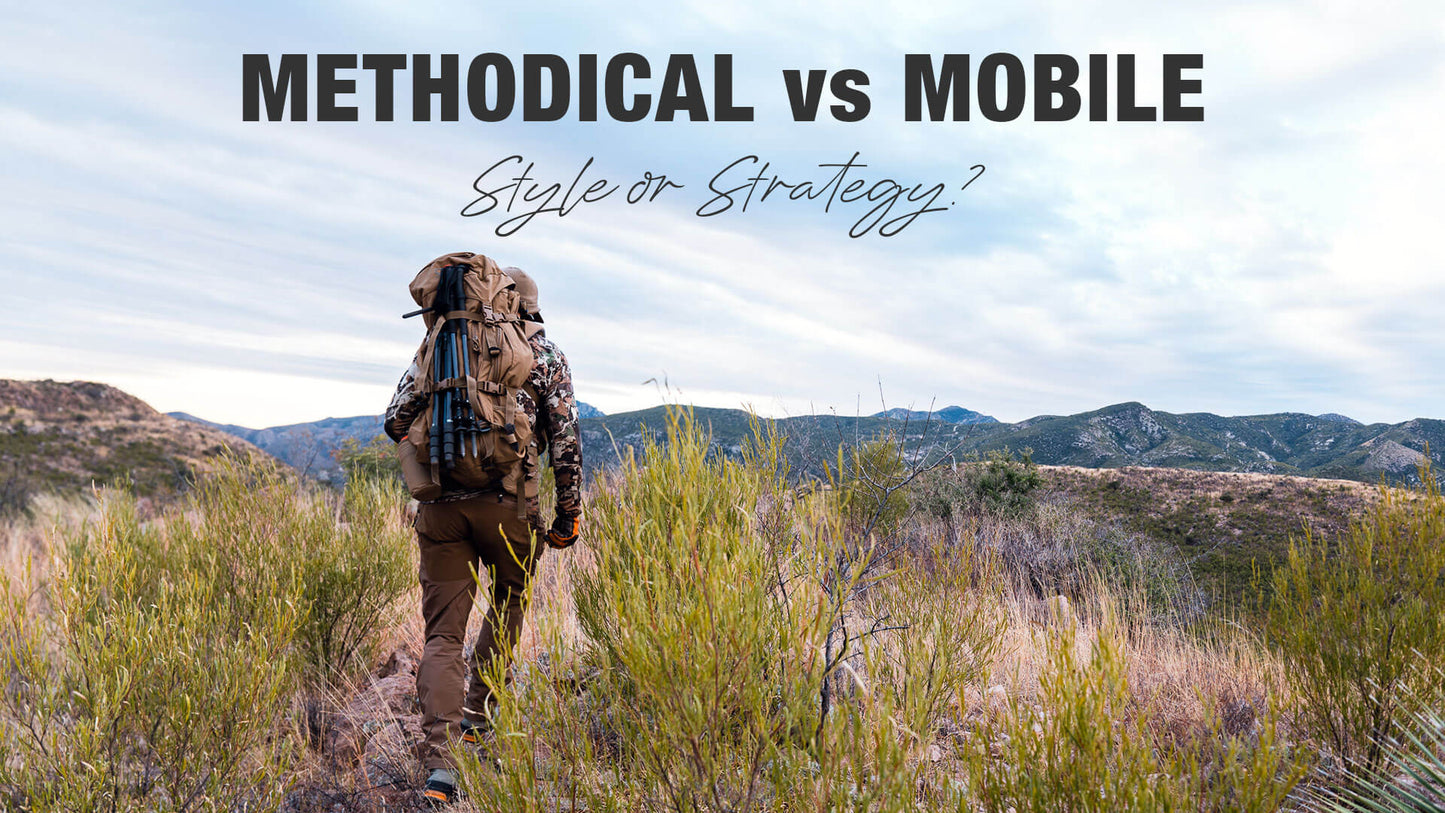
Gosh dang, it was hot. For the better part of 4 days, we had been sitting at one of my favorite bear hunting spots. A spot that has always produced bears, and one that I had ultimate faith in through the years. This year though, the hunters outnumbered the bears 9-0. In the past I knew that if I just put the time in there, a bear was sure to walk by. Things change though. My methodical method of hunting in this spot had always worked, but it wasn't working any longer.
Historically, I have been more of a methodical hunter rather than a mobile hunter. This hunting style was how I was taught by my Dad long ago.
"Be patient and it'll happen."
As I grew older and started to hunt with guys outside my family, I came to realize that my methodical style was different from how many of these other hunters spent their time in the field. They liked to move more, and that seemed to work for them.

Methodical or mobile. They can both work, but which approach is the right one? Or is each approach just a matter of your preferred hunting "style" and less about which is strategically more effective?
This article is more than just the standard "pros and cons" of each approach. I want to lay out when, where, and why each method can shine. And in the end, why you should strive to be a well-rounded hunter and a practitioner of both.
"THE WHEN"
While both methods shine in their own right, WHEN you choose to use one or the other will influence your hunting success. A great example of this is your familiarity or experience with the hunting area.
As you gain experience in a certain area, you know how to focus on the prime hunting zones within the larger context. Being methodical at this point makes sense, but it didn't come without being mobile first. That's not to say you couldn't be methodical from the get-go and use slower tactics like still-hunting or ambush-hunting, but just know that a slower approach often leads to slower success in a new area.
Methodical: "done according to a systematic or established form of procedure."

For another example of WHEN to choose between a methodical vs mobile approach, let's consider mule deer hunting during the early season, compared to during the rut.
During the rut, deer will be very active on and off throughout the entire day. Since the deer are up and moving, you often won't need to be. The timing of this hunt lends itself to a more methodical, sit and glass approach. In contrast, deer in the early season move on a shorter "feed to bed" program and are laid up most of the day. The zone in which they move tends to be small, which means you've only got a small window of time and space to find them on their feet. An early season hunt requires a more mobile approach to find deer.
"THE WHERE"
Where you are matters. How the landscape lies in front of you and what is on that landscape will dictate the effectiveness of a methodical or mobile style. Each method can work in any environment, but your visibility through that landscape is what will ultimately shine a light on the better of the two.
Mobile: "able to move or be moved freely or easily."
Steep mountains and open plains allow for a lot of looking. Ideal conditions for someone who likes to glass for game. In these types of landscapes, it makes a whole lot of sense to be more mobile. And the more open, the more mobile you should be. It doesn't make sense to stare at a tiny patch of trees in an endless sea of sagebrush if you haven't seen anything. Cross it off and move on.

Hunting where there are a lot of trees and cover? That's a different scenario. Say you're looking at a vast basin that has thick timber pockets spread throughout. You've got a great view, but because of the timber, you can't necessarily cross the area off so quickly. Animals could be bedded in these denser areas and it will take time for them to materialize.
When we decrease visibility, we should decrease the speed at which we cover that country — whether on foot, or via our optics. These areas can't be looked over so quickly. Take archery hunting elk in dark timber. Your visibility is severely limited, which means your attention and senses need to be at an all-time high. You need to intentionally look on the ground for tracks and scat, constantly glancing up ahead for movement, carefully listen for sticks breaking or faint calls, and even keep your nose sensitive to the smell of elk.
Being mobile in these areas is definitely possible, but the mph will be slower given the circumstances. You are almost forced to be a bit more methodical here. That is, if you are striving for efficiency.
"THE WHY"
Why a person hunts the way they do is entirely personal, but there are reasons to be methodical and reasons to be mobile.
Being more mobile feeds that "what's over the next ridge" mentality. It's for the explorer. In doing so, you'll get to see much more of the landscape. You'll learn a great deal about the whereabouts of nooks and crannies, where the water and feed are, what the best glassing points are, and even find good future camping spots for yourself. Potentially, you'll see more animals as well. It can be the fast track to seeing what's walking around. This is a fantastic approach for hunting "new to you" country.

Don't hunt too fast though. It's really easy to miss things and not let an area show its potential. Remember, great things take time and animals operate on their own schedule.
A methodical hunting approach is for the thinker. It is for the chess player who thinks 2 steps ahead and wants to know everything about an area before moving on. While this is a much slower approach, it does provide more defined and consistent end results. Heck, I'd even go as far as to say better shot opportunities. When you know what an animal will do before they do it, it's much easier to be calculated in the final moments. If you have done your homework on the area and the animals, a methodical approach means more time spent in higher percentage areas, which will ultimately lead to more success.
With that being said, just don't get too wrapped up in an area. While I don't believe in "wasting time" in the outdoors, there is such a thing as wasting time when it comes to filling your tag. If a spot isn't working, it isn't working. You have to find the line between being patient and pointless.
EFFICIENT ON ALL FRONTS
The giant takeaway from all of this is to be efficient on all fronts. Certain tools work better for certain jobs than others. And knowing when, where, and why to use those tools will lead to more efficient use of your time, with a better end result. Recognize when an area is best hunted with a methodical approach, and accept when it's time to pull the plug and get moving. Be a mobile hunter that is methodical. Be the explorer and the thinker.

Rewinding to that bear hunt I mentioned at the beginning of this article — after much mental debate and doubting what was in front of me, I came to grips with the fact that it was time to pick up shop and find greener pastures. My curiosity would land me in a new area that I'd never stepped foot in. And that curiosity led to a heavy backpack and cooler full of bear meat later that night.
Have a method to your madness. Pair your style with some strategy.
Josh Kirchner is the author of the book, Becoming a Backpack Hunter, as well as the voice behind Dialed in Hunter, a blog that not only documents his own journey, but provides gear reviews, tips/tactics for western hunting, and encourages other hunters to chase and achieve their goals. Josh is a passionate bowhunter that has been hunting with his family since he was a small boy. When he is not chasing elk, deer, bear, and javelina through the diverse Arizona terrain, he is spending time with his wife, daughter, and two herding dogs.
